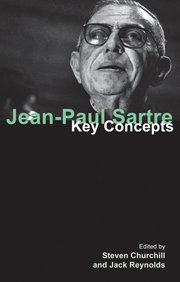Book contents
- Frontmatter
- Contents
- Contributors
- Acknowledgements
- Note on abbreviations
- 1 Introduction: Sartre vivant
- 2 Life and works
- Part I PSYCHOLOGY, PSYCHOANALYSIS AND LITERATURE
- Part II ONTOLOGY: FREEDOM, AUTHENTICITY AND SELF-CREATION
- Part III ETHICS AND POLITICS
- 15 Politics and the engaged intellectual
- 16 Sartre's theory of groups
- 17 Sartre's second or dialectical ethics
- 18 Hope and affirmation: an ethics of reciprocity
- 19 Sartre's legacy
- Bibliography
- Index
16 - Sartre's theory of groups
from Part III - ETHICS AND POLITICS
- Frontmatter
- Contents
- Contributors
- Acknowledgements
- Note on abbreviations
- 1 Introduction: Sartre vivant
- 2 Life and works
- Part I PSYCHOLOGY, PSYCHOANALYSIS AND LITERATURE
- Part II ONTOLOGY: FREEDOM, AUTHENTICITY AND SELF-CREATION
- Part III ETHICS AND POLITICS
- 15 Politics and the engaged intellectual
- 16 Sartre's theory of groups
- 17 Sartre's second or dialectical ethics
- 18 Hope and affirmation: an ethics of reciprocity
- 19 Sartre's legacy
- Bibliography
- Index
Summary
The existential subject
Sartre's ontology begins from the situation of the subject, not as an abstract category but as embodied and individual. Each of us is such a subject, and each of us knows only the subject that he or she is. As a subject I exist, that is to say I stand out (the root meaning of “exist”) into a world that I encounter in its immediacy and its otherness. Objects in the world are what they are, but this implies also that they just are, that they have being. At first this being is apprehended only in its relation to me. Let me follow Sartre's example and take a simple case, an everyday object such as a letter-opener. The letter-opener presents itself to me as existing, that is as standing out into a world of other objects (including my physical body), but its being is in the first instance a “being-for-me”.
Objects in the world disappear and reappear, and the simplest way of accounting for this is to assume that they have a form of being which is independent of their “being-for-me”. Sartre calls this “being-in-itself”. When the letter-opener is in my hand it has being-in-itself and being-for-me; when it is no longer present to me it has being-in-itself, but need not have being-for-me; but if it is lost or destroyed and I think of it, it still has being-for-me though it may no longer have being-in-itself.
- Type
- Chapter
- Information
- Jean-Paul SartreKey Concepts, pp. 184 - 194Publisher: Acumen PublishingPrint publication year: 2013

